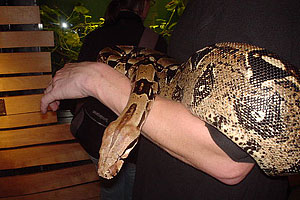 Often at the California Academy of Sciences, you will see docents out on the floor of the museum with an example from our live animal collection.The Academy offers chances to get up and personal with a variety of reptiles, including Skinks and Ball Pythons. Docents follow up these close encounters by offering antimicrobial soap to guests to clean their hands-- not because the animals are slimy or grimy, but as a precaution against transmitting Salmonella bacteria from animals to people.
Often at the California Academy of Sciences, you will see docents out on the floor of the museum with an example from our live animal collection.The Academy offers chances to get up and personal with a variety of reptiles, including Skinks and Ball Pythons. Docents follow up these close encounters by offering antimicrobial soap to guests to clean their hands-- not because the animals are slimy or grimy, but as a precaution against transmitting Salmonella bacteria from animals to people.
You've probably heard of this bacteria before, as an unpleasant bug that sometimes finds its way into high-protein foods such as meat, fish, and eggs. It is also naturally found on and in many reptiles, and does not usually make the animals sick, but if passed to humans-- particularly young children, the elderly and infirm -- it can cause a serious infection called Salmonellosis.
But selecting the right anti-microbial was not as easy a choice as we thought it would be.
Food and Drug Administration published reports question the use of antibacterial soap and hand sanitizers, saying that it found no medical studies that showed a link between a specific consumer antibacterial product and a decline in infection rates. Plus, regular soap kills 90% of bacteria and leaves little impact on the environment.
Additionally, anti-bacterial products like Purell use synthetic polymers known as Triclocarban and triclosan to kill off bacteria. Triclosan is known to promote the growth of resistant bacteria, including E. coli, and both pose environmental toxicity risks; after washing your hands or washing the dishes they can get into the waste water system. Because they do not break down or get filtered out during waste water treatment, up to 75 percent of the original amount gets into the Bay. Once in the environment, these products have been known to disrupt the health of marine life and other wildlife.
